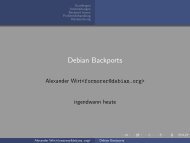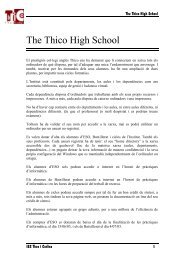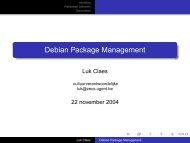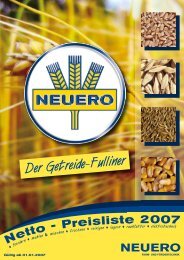Free Software In Biology Using Debian-Med: A Resource For ...
Free Software In Biology Using Debian-Med: A Resource For ...
Free Software In Biology Using Debian-Med: A Resource For ...
You also want an ePaper? Increase the reach of your titles
YUMPU automatically turns print PDFs into web optimized ePapers that Google loves.
which specialises Knoppix for computational biology and<br />
chemistry.<br />
VLinux Bioinformatics Workbench Also VLinux is at the time<br />
of writing a Live CD based on the same outdated Knoppix<br />
version 3.3 as Vigyann and includes a slightly changed software<br />
selection and surely a different background layout.<br />
These are too many different initiatives that could all well do much<br />
more in order to share the burden of maintenance and updates. With<br />
<strong>Debian</strong> they have he right basic infrastructure. The time will show,<br />
whose packages will gain most momentum.<br />
3.3 Bioinformatics and <strong>Debian</strong>-<strong>Med</strong><br />
<strong>Debian</strong>-<strong>Med</strong> is a Custom <strong>Debian</strong> Distribution with the aim to develop<br />
<strong>Debian</strong> into an operating system that is particularly well fit<br />
for the requirements for medical practice and research. The goal<br />
of <strong>Debian</strong>-<strong>Med</strong> is a complete system for all tasks in medical care<br />
which is build completely on free software.<br />
On the technical side <strong>Debian</strong>-<strong>Med</strong> contains a set of meta packages<br />
that declare dependencies on other <strong>Debian</strong> packages, and that way<br />
the complete system is prepared for solving particular tasks. A<br />
special user menu will be created to enhance usability for the user<br />
working in the field of medicine.<br />
On the organisational side the project tries to attract people working<br />
in the field of <strong>Free</strong> <strong>Software</strong> in medicine to share the effort of<br />
building a common platform which reduces the amount of work for<br />
developers and users. Sharing the effort in publishing free medical<br />
software to a large user base is a main advantage of <strong>Debian</strong>-<strong>Med</strong>.<br />
Currently inside <strong>Debian</strong>-<strong>Med</strong> applications are provided in certain<br />
categories: medical practice and patient management, medical research,<br />
hospital information systems, medical imaging, documentation,<br />
molecular biology and medical genetics and others. The last<br />
part seems to be the most interesting and will be introduced in more<br />
detail.<br />
There are two so called meta packages which are named med-bio<br />
and med-bio-dev. The sense of a meta package is that you have<br />
to install only one single package using a package management<br />
software inside <strong>Debian</strong> to get all interesting packages which are<br />
necessary for a single task. <strong>For</strong> instance if a user types in:<br />
apt-get install med-bio<br />
all applications inside <strong>Debian</strong> which are related to the field of<br />
molecular biology and medical genetics will be installed. Moreover<br />
system users will get an extra menu which contains all these<br />
applications. The med-bio-dev package just installs programming<br />
libraries and tools which are interesting for users who want<br />
to develop biological applications (for instance the NCBI library[4,<br />
1, 3]).<br />
The strength of <strong>Debian</strong> is the huge number of developers (more<br />
than 1000) all over the world working in different fields1. Some of<br />
them are working in the field of biology or medicine and thus have<br />
a natural interest in developing a rock solid system they can relay<br />
on for their own work (not only commercial interest to sell service<br />
per accident). That is the reason why <strong>Debian</strong> is often the platform<br />
of choice for researcher in the field of biology: They just find what<br />
their colleagues all over the world are using. The more the <strong>Debian</strong><br />
user in the field of biology report back about problems or wishes<br />
Programming libraries: BioPerl, BioPython<br />
Sequence similarity: BLAST2, Cluster3 ∗ , ClustalW, e-<br />
PCR<br />
Pretty printing: Boxshade, TeXshade ∗ , Textopo ∗<br />
Phylogeny: Molphy, Phylip, Treeview<br />
Tool collection: EMBOSS ∗∗ , EMBASSY ∗∗ , Bioconductor<br />
∗ , ncbi-tools library and programs,<br />
ARB, Primer3 ∗<br />
Molecular modeling: Garlic<br />
Gene detection: Glimmer, Artemis ∗∗<br />
Genetics: R/qtl<br />
Viewers: Rasmol, Treetool<br />
Pattern discovery: SMILE ∗ , HMMer<br />
Table 1: Overview on packages in <strong>Debian</strong>-<strong>Med</strong>. ∗ marks packages<br />
of collaborators of <strong>Debian</strong> <strong>Med</strong> that are not yet part of<br />
the <strong>Debian</strong> main distribution, ∗∗ marks <strong>Debian</strong> packages made<br />
available through third parties.<br />
the more <strong>Debian</strong> maintainers are able to enhance their system for<br />
their own and their users profit.<br />
<strong>In</strong> order to achieve a cooperation between virtual organisations,<br />
which seems essential since a single Grid has many virtual organisations<br />
and the virtual organisations may work across Grids, an<br />
infrastructure and policies for their cooperation is required. We regards<br />
this as equivalent to the collaboration between individuals,<br />
which is exactly what <strong>Debian</strong> was developed for.<br />
<strong>Debian</strong> harbours the most known and well accepted tools in bioinformatics.<br />
An incomplete overview of these is given in table 1.<br />
A more detailed overview is available at the <strong>Debian</strong>-<strong>Med</strong> website.<br />
<strong>Debian</strong> has means to inform the community of programs that<br />
should be packed and the <strong>Debian</strong>-<strong>Med</strong> mailing list serves for an<br />
additional information transfer.<br />
4. DISCUSSION<br />
Technically the <strong>Debian</strong> community has implemented functionalities<br />
for package management that have not been seen elsewhere.<br />
Originally motivated to achieve platform independence, all packages<br />
in the <strong>Debian</strong> Main distribution are required to be completely<br />
compilable and installable by a standardised set of commands. <strong>For</strong><br />
all platforms, build daemons fully automated build binary packages<br />
upon the package maintainer’s submission of a new source package.<br />
The principle to dynamically add all required packages (i.e.<br />
specialised libraries) and the subsequent removal of these packages,<br />
should be adopted by the agent and grid communities, fostering<br />
increased flexibility and the better utilisation of human and<br />
machine resources.<br />
The <strong>Debian</strong>-<strong>Med</strong> project serves as a common platform for all <strong>Free</strong><br />
<strong>Software</strong> that may be utilised in medical care. Tools developed in<br />
computational biology is just a part of it because it is an important<br />
brick in medical science. With <strong>Debian</strong>-<strong>Med</strong>’s ambition to become<br />
the platform of choice for biological work, conform with the principles<br />
of the <strong>Debian</strong> Policy [12], by the means of the distribution<br />
of development within the <strong>Debian</strong> Society, a well established reference<br />
platform for bioinformatics research and its medical applications<br />
has evolved and will continue to improve. The organisation is<br />
open, both to new members and to external sites offering packages<br />
for installations. <strong>In</strong>itiatives for agent research and computational<br />
grids should strongly consider to utilise the prepared packages.






